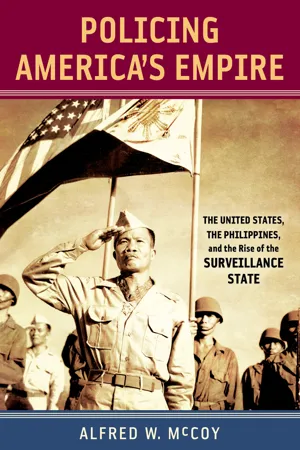
Policing America's Empire
The United States, the Philippines, and the Rise of the Surveillance State
- 759 pages
- English
- PDF
- Available on iOS & Android
Policing America's Empire
The United States, the Philippines, and the Rise of the Surveillance State
About This Book
At the dawn of the twentieth century, the U.S. Army swiftly occupied Manila and then plunged into a decade-long pacification campaign with striking parallels to today's war in Iraq. Armed with cutting-edge technology from America's first information revolution, the U.S. colonial regime created the most modern police and intelligence units anywhere under the American flag. In Policing America's Empire Alfred W. McCoy shows how this imperial panopticon slowly crushed the Filipino revolutionary movement with a lethal mix of firepower, surveillance, and incriminating information. Even after Washington freed its colony and won global power in 1945, it would intervene in the Philippines periodically for the next half-century—using the country as a laboratory for counterinsurgency and rearming local security forces for repression. In trying to create a democracy in the Philippines, the United States unleashed profoundly undemocratic forces that persist to the present day.
But security techniques bred in the tropical hothouse of colonial rule were not contained, McCoy shows, at this remote periphery of American power. Migrating homeward through both personnel and policies, these innovations helped shape a new federal security apparatus during World War I. Once established under the pressures of wartime mobilization, this distinctively American system of public-private surveillance persisted in various forms for the next fifty years, as an omnipresent, sub rosa matrix that honeycombed U.S. society with active informers, secretive civilian organizations, and government counterintelligence agencies. In each succeeding global crisis, this covert nexus expanded its domestic operations, producing new contraventions of civil liberties—from the harassment of labor activists and ethnic communities during World War I, to the mass incarceration of Japanese Americans during World War II, all the way to the secret blacklisting of suspected communists during the Cold War."With a breathtaking sweep of archival research, McCoy shows how repressive techniques developed in the colonial Philippines migrated back to the United States for use against people of color, aliens, and really any heterodox challenge to American power. This book proves Mark Twain's adage that you cannot have an empire abroad and a republic at home."—Bruce Cumings, University of Chicago"This book lays the Philippine body politic on the examination table to reveal the disease that lies within—crime, clandestine policing, and political scandal. But McCoy also draws the line from Manila to Baghdad, arguing that the seeds of controversial counterinsurgency tactics used in Iraq were sown in the anti-guerrilla operations in the Philippines. His arguments are forceful."—Sheila S. Coronel, Columbia University "Conclusively, McCoy's Policing America's Empire is an impressive historical piece of research that appeals not only to Southeast Asianists but also to those interested in examining the historical embedding and institutional ontogenesis of post-colonial states' police power apparatuses and their apparently inherent propensity to implement illiberal practices of surveillance and repression."—Salvador Santino F. Regilme, Jr., Journal of Current Southeast Asian Affairs "McCoy's remarkable book... does justice both to its author's deep knowledge of Philippine history as well as to his rare expertise in unmasking the seamy undersides of state power."— POLAR: Political and Legal Anthropology Review Winner, George McT. Kahin Prize, Southeast Asian Council of the Association for Asian Studies
Frequently asked questions
Information
Table of contents
- Contents
- Acknowledgments
- Abbreviations
- Prologue: Analogies of Empire
- 1 Capillaries of Empire
- Part One U.S. Colonial Police
- Part Two Philippine National Police
- Notes
- Index